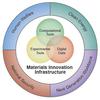Welcome to the Materials Science and Engineering Division
The Materials Science and Engineering Division performs leading-edge measurement science research, working closely with our stakeholders to impact a broad range of science and technology areas. Our core areas of competence are grounded in the discipline of materials science and engineering (structure-property-processing relationships) with specific focus on metallurgy, polymer science, and functional materials. This expertise has expanded in recent years to include nanoscale materials (2D materials), complex fluids (colloids, emulsions), advanced devices (electronic, magnetic, energy), and advanced manufacturing (additive, biomanufacturing).
Projects and Programs
NIST Priority Area | MSED Project or Program |
|---|---|
ADVANCED MANUFACTURINGMSED is leading the development of the measurement and data infrastructure needed to ensure that advanced materials can be deployed in the complex, dynamic environments that exist in manufacturing. We provide stakeholders access to and knowledge about powerful, integrated capabilities (e.g., materials data and informatics, computational methods, unique measurement facilities) within a pre-competitive environment that can advance both their specific needs and new materials design and manufacturing concepts. | Additive Manufacturing of Metals Advanced Materials Design: Structural Applications Polymer Additive Manufacturing and Rheology Dynamic Plasticity: Non-Equilibrium Mechanics Hardness Standardization and Measurements Fundamentals of Polymer Mechanics |
ADVANCED MICROELECTRONICS AND PACKAGINGMSED is developing measurement-based solutions and capabilities to facilitate innovations in materials design, device architecture, and fabrication processes, particularly those relevant to transistor devices, memory, and interconnects. To address relevant technological challenges, we provide measurements to enable materials and process development as well as advances in dimensional measurements, chemical composition, and the properties of materials and material interfaces associated with reduced feature sizes, increased geometric complexities, and low chemical contrast. | Low Dimensional and Magnetic Thin Film Materials |
BIOMANUFACTURINGBuilding on our polymers expertise, MSED is developing and applying unique measurement capabilities and well-defined materials for guiding and evaluating biomanufacturing processes and product formulation. We are pursuing advancements in lab automation and AI/ML methods in combination with our expertise in light, soft X-ray, and neutron scattering and in fluidics and flow metrology to enable innovation in bioformulations, particularly involving measurements of highly concentrated solutions and stability mapping. | Polyelectrolyte Solutions and Gels Fluid Suspensions and Emulsions Resonant Soft X-ray Scattering (RSoXS)
|
CIRCULAR ECONOMY: PLASTICS RECYCLINGMSED is creating new measurement capabilities, data platforms, and well-defined materials to support mechanical and chemical reprocessing of post-consumer resin (PCR) waste streams, including molecular and polymer processes and associated measurements to identify and separate, compatibilize, and depolymerize PCR for reuse in production processes. | |
CLIMATE AND ENERGYMSED is addressing materials and measurement challenges for Direct Air Capture (DAC) technologies associated with the use of polymer membranes and solid sorbent materials and for electrocatalytic conversion of carbon dioxide into useful chemicals and specialty products. These and other division capabilities are also being applied to underpin clean energy technologies. | |
PHYSICAL INFRASTRUCTUREMSED is developing a range of measurement capabilities to evaluate defects and damage progression in polymer matrix composites with an emphasis on novel optical, spectroscopic, and mechanical techniques. | Polymer Composites |
INNOVATIVE MEASUREMENT SCIENCEMSED has a strong history in the development of new measurement science capabilities. | Resonant Soft X-ray Scattering (RSoXS) Magnetic Materials Metrology / Thermal MaGIC Measuring Intermolecular Interactions with Electro-Acoustic Spectroscopy |
STAKEHOLDER IMPACTS
nSoft
This consortium delivers technology and expertise within neutron-based measurement science to U.S. based industrial researchers. The impact of the consortium is based on close and extended collaboration, where member companies often have staff positioned on the NIST campus for extended periods of time. Members, having participated on-site at the NIST Center for Neutron Research, gain the expertise in the use of equipment and software targeted toward their sector of manufacturing.
NCAL
The objective of this consortium is to develop the measurement methodology, standards and analysis necessary for the U.S. auto industry and base metal suppliers to transition to advanced lightweight materials for auto body components without wasteful trial-and-error development cycles, and successfully transfer this technology to our customers in industry.
AMBench
This is a continuing series of highly controlled benchmark tests for additive manufacturing, with modeling challenge problems. Results are discussed at the corresponding conference series.
News and Updates
Tools and Instruments
Contacts
-
(301) 975-8795
















